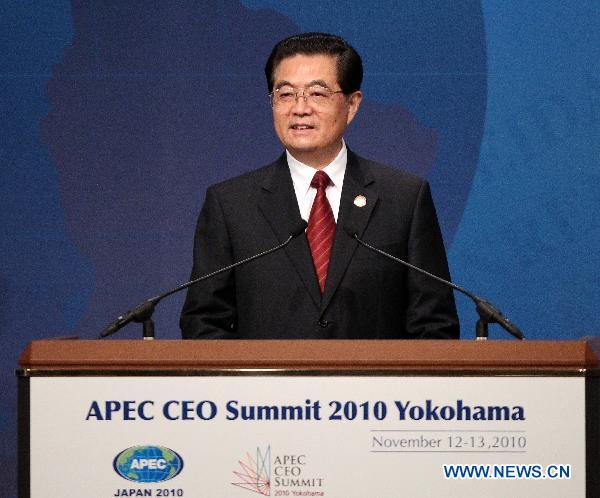Hu: Emerging economies contribute to world development
Chinese President Hu Jintao said Saturday that Asia-Pacific emerging markets have made important contribution to world development, but still face many daunting challenges.
 |
|
Chinese President Hu Jintao addresses the APEC CEO Summit in Yokohama, Japan, Nov.13, 2010. |
Hu, during a speech at the CEO summit of the Asia-Pacific Economic Cooperation (APEC), said emerging markets in the Asia-Pacific region, with robust and sustained development, have become an important engine driving world economic growth.
"In the fight against the international financial crisis, the emerging markets were the first to achieve an economic rebound and fairly rapid growth and played an important part in promoting world economic recovery," Hu said in the speech titled "Towards Common Development and Shared Prosperity."
"Their development and their future will have a major impact not only on the Asia-Pacific, but also the whole world," he said.
Hu brought forward four observations on the Asia-Pacific emerging markets.
First, the Asia-Pacific emerging markets have made important contribution to world development and will continue to offer enormous development opportunities, he said.
"The rapid development of emerging markets in our region has changed the state of backwardness in many countries and regions and improved the lives of hundreds of millions of people," he said.
It has contributed significantly to the endeavor to narrow development gaps, reduce poverty and attain the UN Millennium Development Goals, he added.
"Looking ahead, the emerging markets in the Asia-Pacific will offer even more opportunities for world economic development in terms of resources, goods, market and capital," he said.
Second, the Asia-Pacific emerging markets still face many daunting challenges despite their rapid development, the Chinese president said.
"They must meet the major challenge of ensuring coordinated development between urban and rural areas, among different regions and between the economic sector and the social sector," he said.
"They still have a long way to go before they can achieve comprehensive development and they must make sustained and strenuous efforts," he added.
"While acknowledging their development achievements, the international community must fully appreciate their difficulties and challenges," Hu said.
Third, the Asia-Pacific emerging markets have actively responded to global challenges and the international responsibilities they undertake should be commensurate with their development stage, President Hu said.
"The Asia-Pacific emerging markets have taken an active and constructive part in international cooperation and worked with various parties to counter such global challenges as the international financial crisis, climate change, energy and resources security, public health security and serious natural disasters," he said.
"We must remember, however, that the Asia-Pacific emerging markets are still at the primary stage of development, and both their capabilities and resources are limited," he said.
"The international community should encourage emerging markets in the Asia-Pacific to assume international responsibilities on the basis of their capabilities, national circumstances and stage and level of development," he added.
Fourth, the international community should improve the international economic and financial systems and create an enabling environment for the common development of emerging markets and all other countries, Hu said.
The existing international economic and financial systems have played a positive role in the development of the emerging markets in the Asia-Pacific, he said.
"But it is necessary to further improve them through appropriate reform and adjustment measures and adapt them to the changing economic situation," he added.
The APEC CEO summit, one of the most important sessions of the business community, is the symbol of APEC public and private cooperation with an aim of contributing to the development of the Asia-Pacific.
 0
0 






